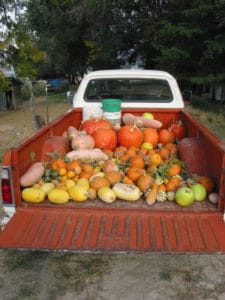Farm Businesses and the Joint Venture Agreement
Picture these scenarios:

Do transportation costs keep you from meeting a local food demand? It may be time to consider a joint venture with another small farm.
1. A restaurant in a nearby city is featuring local produce, but transportation costs keep you from meeting this demand;
2. Keeping business records takes so much time that you often have to choose between neglecting your paperwork and neglecting your farm. Many of your neighbors face the same dilemma, but none of you can afford to hire a bookkeeper;
3. Your dairy could grow with regular access to a pasteurizer, but you cannot or will not finance one on credit, and you are not profitable enough to buy one outright;
4. You want to start producing value-added products under your own brand, but lack the expertise to turn your own pork into bacon, sausage, and salami.
In all of these cases, and more, a small agricultural business has grown into a sort of awkward middle ground: it is dealing with the same problems as large-scale producers and processors, but without the resources to address these problems. In many cases, these businesses should consider forming a joint venture to address their concerns.
A joint venture works like a partnership between two or more businesses (the “venturers”), and is formed in order to achieve a specific result which neither of the businesses could easily accomplish on its own. Joint ventures can be formed for a single purpose (such as building an enclosure for a farmer’s market) or an ongoing project (such as operating a flour mill for the benefit of the venturers). A joint venture can be beneficial to a small business for many reasons, including:
1) Combining net profit in order to purchase services that can be efficiently shared (such as producers sharing space on a delivery truck rather than handling deliveries individually);
2) Sharing services internally which none of the venturers could afford on their own (such as sharing the services of a single bookkeeper among several different farms or businesses);
3) Combining capital for the purchase of equipment or infrastructure (such as wheat farmers and bakers contributing to the construction of a flour mill);
4) Sharing expertise in a manner that will benefit both venturers (such as a pig farmer contracting with a butcher to make and sell bacon under the farmer’s own brand).
A joint venture is a business or undertaking operated for the benefit of the venturers. A joint venture can be a corporation, a partnership, or merely a contractual agreement to perform certain actions. The particular purpose of the joint venture should dictate what form it should take.
A joint venture is formed by agreement of the venturers. To protect all of the parties, the agreement should be in writing; and should be written as clearly as possible so that each party understands what they are signing up for. It is worthwhile for the parties to hire lawyers to negotiate and draft a sound agreement up front, to minimize unmet expectations, lost profits, hard feelings, and litigation down the line.
Forming a joint venture should be considered as carefully as starting any other business. A joint venture must be strategically sound: it must make sense both for its own sake and for the venturers.
Setting up the right corporate form and signing the right contract for your joint venture are necessary to the long-term success of the venture, but they are not enough to ensure success. The key factor in determining whether a strategically sound venture will succeed is how well the people in the joint venture work together.
It is essential for the venturers to understand not only what can be gained in success, but also what can be lost in failure, and the give-and-take that will be necessary to operate the venture. At the same time, joint ventures pose a certain amount of risk to the individual venturers. Each business must consider how much information about their business they can afford to share with the other venturers. It will also be necessary, particularly in ventures to add value to a product, to determine in advance how and when ownership of inventory changes hands.
In many joint ventures, it will be necessary to outline the terms of the ownership of the venture, and the terms for use and repair of its assets. The venturers should also agree in advance about what should happen if one of them wants to cash out its share of the venture: how should the share be valued, and whether the departing member should be allowed to sell the share on the open market.
The joint venture is a powerful tool for helping small agricultural businesses to build a local food economy. The considerations raised in this article should help you to start thinking about ways in which you can use this tool to advance your own business.

